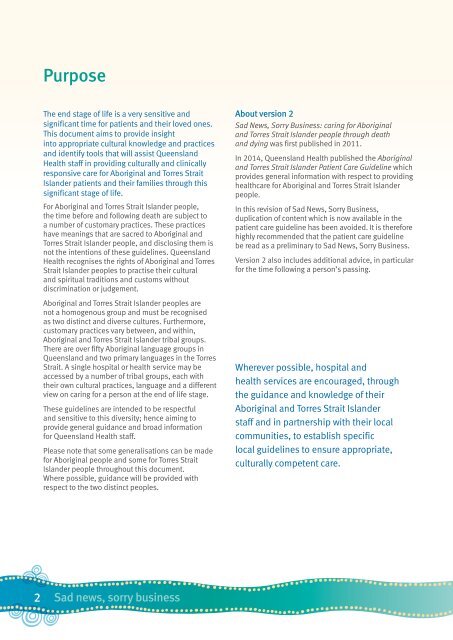sad news sorry business
6ljl6DfKF
6ljl6DfKF
You also want an ePaper? Increase the reach of your titles
YUMPU automatically turns print PDFs into web optimized ePapers that Google loves.
Purpose<br />
The end stage of life is a very sensitive and<br />
significant time for patients and their loved ones.<br />
This document aims to provide insight<br />
into appropriate cultural knowledge and practices<br />
and identify tools that will assist Queensland<br />
Health staff in providing culturally and clinically<br />
responsive care for Aboriginal and Torres Strait<br />
Islander patients and their families through this<br />
significant stage of life.<br />
For Aboriginal and Torres Strait Islander people,<br />
the time before and following death are subject to<br />
a number of customary practices. These practices<br />
have meanings that are sacred to Aboriginal and<br />
Torres Strait Islander people, and disclosing them is<br />
not the intentions of these guidelines. Queensland<br />
Health recognises the rights of Aboriginal and Torres<br />
Strait Islander peoples to practise their cultural<br />
and spiritual traditions and customs without<br />
discrimination or judgement.<br />
Aboriginal and Torres Strait Islander peoples are<br />
not a homogenous group and must be recognised<br />
as two distinct and diverse cultures. Furthermore,<br />
customary practices vary between, and within,<br />
Aboriginal and Torres Strait Islander tribal groups.<br />
There are over fifty Aboriginal language groups in<br />
Queensland and two primary languages in the Torres<br />
Strait. A single hospital or health service may be<br />
accessed by a number of tribal groups, each with<br />
their own cultural practices, language and a different<br />
view on caring for a person at the end of life stage.<br />
These guidelines are intended to be respectful<br />
and sensitive to this diversity; hence aiming to<br />
provide general guidance and broad information<br />
for Queensland Health staff.<br />
Please note that some generalisations can be made<br />
for Aboriginal people and some for Torres Strait<br />
Islander people throughout this document.<br />
Where possible, guidance will be provided with<br />
respect to the two distinct peoples.<br />
About version 2<br />
Sad News, Sorry Business: caring for Aboriginal<br />
and Torres Strait Islander people through death<br />
and dying was first published in 2011.<br />
In 2014, Queensland Health published the Aboriginal<br />
and Torres Strait Islander Patient Care Guideline which<br />
provides general information with respect to providing<br />
healthcare for Aboriginal and Torres Strait Islander<br />
people.<br />
In this revision of Sad News, Sorry Business,<br />
duplication of content which is now available in the<br />
patient care guideline has been avoided. It is therefore<br />
highly recommended that the patient care guideline<br />
be read as a preliminary to Sad News, Sorry Business.<br />
Version 2 also includes additional advice, in particular<br />
for the time following a person’s passing.<br />
Wherever possible, hospital and<br />
health services are encouraged, through<br />
the guidance and knowledge of their<br />
Aboriginal and Torres Strait Islander<br />
staff and in partnership with their local<br />
communities, to establish specific<br />
local guidelines to ensure appropriate,<br />
culturally competent care.<br />
2 Sad <strong>news</strong>, <strong>sorry</strong> <strong>business</strong>


